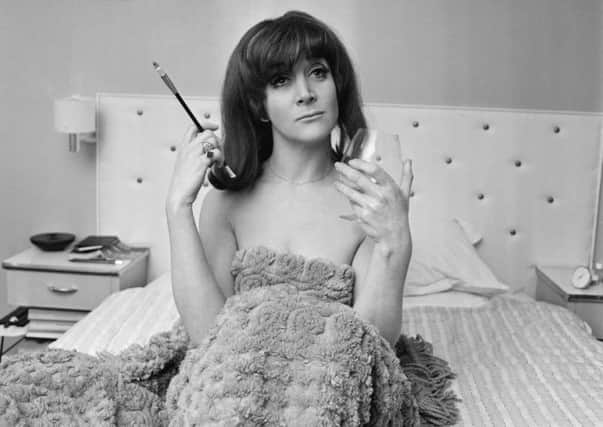Obituary: Sheila Steafel, gifted actress who never received the recognition her talents deserved


Sheila Steafel appeared in everything from Chekov to Holby City. She shared stage or screen with the Royal Shakespeare Company, the Daleks and Kenny Everett, though obviously not at the same time. She played everyone from Adrian Mole’s mum to Margaret Thatcher and starred in her own one-woman show at the Edinburgh Fringe.
Steafel wanted to be a serious actress, but it was as a comic actress that she enjoyed her greatest success, most notably in the 1960s as the regular female member of the satirical troupe on The Frost Report, with David Frost, Ronnie Corbett, Ronnie Barker and John Cleese.
Advertisement
Hide AdAdvertisement
Hide AdBut that was more than half a century ago and she never quite cemented herself in the public consciousness in the way her Frost Report co-stars or her ex-husband Harry H Corbett, the “Son” in Steptoe and Son, did.
Steafel brought out her autobiography in 2010 and called it When Harry Met Sheila, though they were married for only six years in the late 1950s and early 1960s. She was very honest about why she chose that title and included a photo of Corbett on the cover. “I have kind of slipped out of the public eye,” she said. “Harry is much more well known.”
Steptoe and Son, with its tragicomic hard edge and echoes of Samuel Beckett, found new followers over the years, whereas The Frost Report was very much of its time. Steafel was, in fact, a character in the television play The Curse of Steptoe in 2008, played by Zoe Tapper, with Jason Isaacs as Corbett and Phil Davis as his co-star Wilfrid Brambell.
Steafel’s marriage to Corbett fell apart even before she appeared on The Frost Report, partly because of what she saw as Corbett’s intransigence, jealousy and “almost Victorian attitude towards women” and partly because she was struggling with herself and unresolved issues from childhood and a dysfunctional family situation in South Africa. She admitted that she was “difficult”.
The younger of two children, Sheila Frances Steafel was born into a Jewish family in Johannesburg in 1935. Her father owned a garage, was an amateur opera singer and was prone to violence. Her mother played piano and the family were waited on by black servants.
Steafel won a dancing competition when she was only three. “I always intended to be an actress even when I was a kid at school and the teacher used to go round the class asking what we wanted to be,” she said. “I always said an actress, but what I really had in mind was a movie star.”
In her final year at senior school Steafel decided to liven up a pantomime with innuendo and was told by the headmistress that she was “a nasty girl with a nasty mind” and would have been expelled had she not been leaving anyway.
She began an arts degree in South Africa, dropped out and headed for London, where she stayed in a hostel and made her own bed for the first time. She failed an audition for Rada, the Royal Academy of Dramatic Art – she was told she looked “unusual” and would have to wait until she was older to get character roles.
Advertisement
Hide AdAdvertisement
Hide AdHowever, she got into the Webber Douglas Academy, won a prize for comedy, worked in repertory theatre, appeared in the West End production of Billy Liar in 1964, with Tom Courtenay, and began getting roles on television. She had small roles in Danger Man (1966) and the film Daleks’ Invasion Earth 2150 AD (1966).
She found herself getting as many offers for comedy as drama and appeared with Peter Cooke and Dudley Moore on their show Not Only… But Also (1965) before joining The Frost Report in 1966. It was a landmark show, with comedy, satire and songs, at a time when Britain had only two TV channels.
While Steafel hardly matched the subsequent success of Frost, Cleese, Barker and Corbett, the show did make her an instantly recognisable face, complete with “unusual” features – heavily lidded eyes and an aquiline nose – and it served as a springboard to other television shows and occasional small roles in films.
She appeared nude in the film adaptation of Henry Miller’s Tropic of Cancer (1970), played the ditzy music-hall entertainer Popsy Wopsy, “just behind the beat and just below the note” on The Good Old Days (1975-81), starred in three series of The Ghosts of Motley Hall (1976-78), which was made for children but also attracted older viewers, and was a regular on The Kenny Everett Television Show (1981-88).
In the 1970s and 1980s Steafel was also a regular on Radio 4’s satirical show Week Ending, providing many voices, including that of Mrs Thatcher. She worked regularly in theatre, too. In the 1980s she played Adrian Mole’s mother in an early theatrical adaptation and she won glowing notices as Mistress Quickly in The Merry Wives of Windsor.
In 1981 she performed her first one-woman show, The Late Sheila Steafel, at the Edinburgh Fringe. The show, which she wrote, included a truncated version of Oklahoma!, lasting one minute and 20 seconds, complete with ballet sequence. It was a hit.
However, in her autobiography she admitted to the “family flaw” of arrogance and indifference to the feelings of others, and revealed that she was “well out of favour” with her producers by the end of festival. Nevertheless, she came back with Steafel Revisited and Steafel Lately.
Steafel had leukaemia and in recent years had focused more on writing than acting. She had a number of relationships after her divorce from Corbett and they provided the inspiration for a well-received collection of humorous short stories, published in 2012. She called it Bastards.
Brian Pendreigh